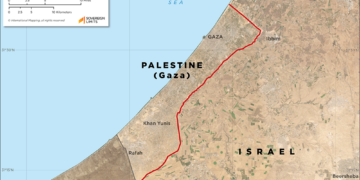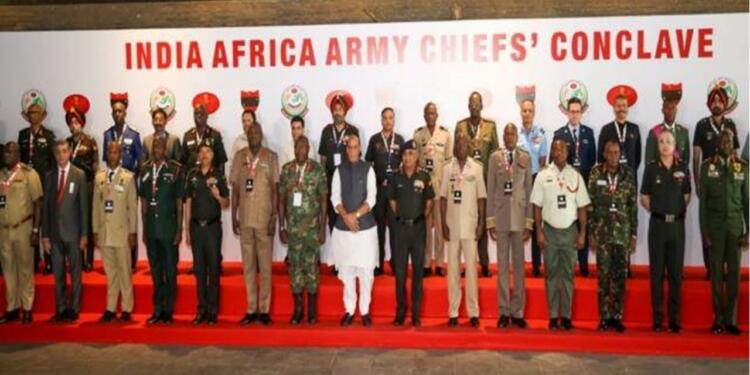AFINDEX-2023: Africa, the second largest and second most populous continent, has 54 countries. The geography of the continent has made it significant for the world since its discovery by the western explorers. The continent was colonised and exploited for a long time. India’s role has been significant in raising the voice for independent Africa at the global level.
Before Indian independence, India, being ruled by the British, got its voice drowned out, but soon after 1947, India’s voice prevailed, and the African cause got a lot of support. Even after independence, the fragile economic condition and political instability pulled many countries into the category of ‘failed states.
But one thing that sustained the external influence on the continent was its resource richness. On the other hand, India eyed Africa more for humanitarian reasons than for economic ones. This is evident from the recent military exercise.
Second AFINDEX-2023
The Chief of the Army Staff of India, General Manoj Pandey, oversaw the successful conclusion of the second edition of the Africa-India field training exercise, AFINDEX-2023. The exercise involved India and 23 African nations and was held from March 21 to March 29, 2023, at the Foreign Training Node in Aundh, Pune.
The multinational exercise focused on promoting regional security and stability by addressing challenges related to humanitarian assistance, mine clearance, and United Nations peacekeeping operations. The exercise also aimed to enhance cooperation and interoperability among the armed forces of the participating nations.
Representatives of various African armies and army chiefs were present at the concluding ceremony of AFINDEX-2023, which showcased the capabilities and readiness of the participating countries’ armed forces. The Indian Army was represented by the Sikh, Maratha, and Mahar regiments, which demonstrated their skills and expertise during the 10-day drill.
India has been actively reaching out to African countries in recent years, and the Africa-India field training exercise is a crucial part of this outreach. The first edition of this exercise was carried out in 2019. The latest edition, AFINDEX-2023, is the second edition of this important training exercise.
Also read: Illegal Africans in India are a direct threat to the national security
AFINDEX-2023: Towards positive military relations
The primary objective of this joint exercise is to promote positive military relations between India and African countries. The exercise serves as a platform for participating nations to share their best practices, exchange knowledge and expertise, and enhance their ability to operate together effectively.
Evidently, India has long been recognised as a significant contributor of troops to United Nations peacekeeping operations worldwide. The country’s army is renowned for its expertise in mine removal operations, making it one of the most respected agencies in this field.
Many African countries face the daunting task of dealing with landmines and unexploded ordnance (UXO) that remain after years of conflict. The joint exercise, AFINDEX-2023, provided an excellent opportunity for participating nations to share their best practices and experiences in addressing these challenges. By exchanging knowledge and expertise on this critical subject, participating nations can enhance their abilities to undertake humanitarian mine action and other peacekeeping operations effectively.
Army Chiefs’ conclave
The exercise among 23 nations was concluded by an Army Chiefs’ conclave, which was addressed by Defence Minister Rajnath Singh. He emphasised the need for cooperation between India and African countries in maritime security and countering terrorism and extremism. Enthusiastic about the domestic production of weapons and other military equipment, Rajnath invited African nations to “explore Indian defence equipment and technologies”.
Leaders and representatives from 31 African nations, as well as civil and defence dignitaries, joined Chief of the Army Staff General Manoj Pande at the conclave.
The importance of prospering India-Africa relations
India is continuously growing its influence on the continent. While this exercise and conclave are steps towards more firm military relations, economic relations are also becoming stronger. According to the statement by Foreign Minister, Dr. S. Jaishankar, India’s trade with Africa reached $89.5 billion in the fiscal year 2021–22. In FY 2022–21, the trade was worth USD 56 billion.
The net increase was around 60 percent in a single year, which is more than the growth of Chinese trade. Africa’s trade with China in the same period jumped to 35 percent. However, the trade amount was far more than India-Africa trade at USD 254.
The positive point for India is that it is one of the top 5 trade destinations for Africa in the world. So, it has the opportunity. This was visible in a concerted attempt by India and Africa to bolster trade relations. In July last year, as many as 40 high-level officials from 17 African countries visited India to beef up commercial relations.
Meanwhile, Union Commerce Minister of India Piyush Goyal also emphasised the intentions of India to reach a trade pact, which could prove beneficial for both India and Africa. Interestingly, India is trading with the majority of African countries on the basis of duty-free tariff preferences (DFTP).
An official scheme of the government of India by which the products originated in LDCs (Least Developed Countries) are given preference and are duty-free. This is applicable to 98.2 percent of the LDC-originating commodities.
Also read: India’s next defence customer from Africa is already lined up
Dealing with the growing assertiveness of China
On the global stage, India is currently raising the voice of the Global South, a group of countries that are less developed than the Global North. This has gained immense respect and support from Africa for New Delhi. India has provided humanitarian support through vaccines, grains, and other pharmaceutical requirements.
India and Africa have a historical connection and share a distinctive relationship due to their common colonial past. India is cautious about China’s increasing dominance on the continent as Beijing has invested massive amounts of money in building infrastructure like roads, bridges, and power installations to gain access to African markets and resources.
Also read: As Africa opens its ‘Lithium treasure’ for India, China is set to cry in the corner
Taking cognizance of that, Indian Prime Minister Narendra Modi organised a summit in New Delhi in 2015 to enhance India’s longstanding ties with African countries. During his speech in the Ugandan Parliament in 2018, Modi presented the “Kampala Principles,” a set of ten principles that guide India’s collaboration with Africa, focusing on promoting economic growth and addressing issues such as terrorism and climate change.
Modi asserted that Africa would be a top priority for India. Additionally, India has significantly contributed to Africa’s humanitarian and educational sectors to augment its soft power. So, this exercise and the following Army Chiefs’ conclave can be loosely described as another step towards narrowing the gap in the Arabian Sea.
Support TFI:
Support us to strengthen the ‘Right’ ideology of cultural nationalism by purchasing the best quality garments from TFI-STORE.COM

























